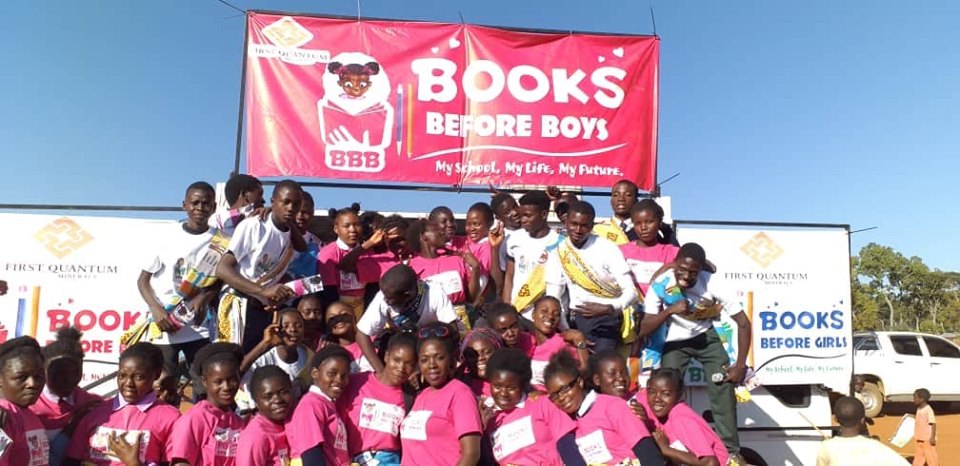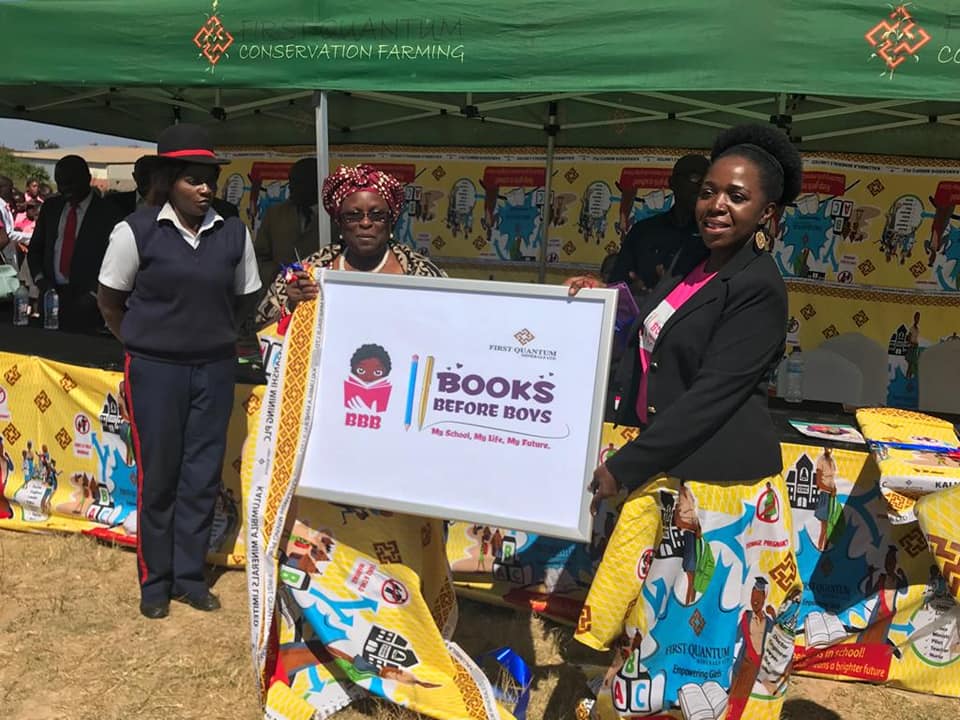We were all teenagers once. Most of us still remember the thrill of transformation and discovery that accompanied our adolescent years. Yet, all too often, we recall this time in our lives with the indispensable hindsight that comes with adulthood. We forget how hastily we once made decisions, or how ill-equipped or ill-informed we were to make them at all.
First Quantum Minerals (FQM) Kansanshi and Kalumbila Minerals Limited’s recently-launched Books Before Boys’ program is a response to this precise situation. The educational and social initiative has been sensitively designed to inform and empower young women — and, crucially, men too — about early and unwanted pregnancies. The premise on which it is based is simple: Most girls of school-going age are only too happy to avoid the life-changing consequences of an early pregnancy. The key is arming them with the information to make their own choices.
FQM Kansanshi and Kalumbila Minerals began running empowerment and education initiatives for adolescent girls seven years ago — from awareness campaigns about teen pregnancies and child marriage, to menstrual hygiene programs — secure in the knowledge that educuation is the most effective and sustainable tool for promoting development in Solwezi and Kalumbila districts, which comprise the mining catchment area. The Books Before Boys (BBB) program is, essentially, an extension of these programs.
“The idea for Books Before Boys was born out of FQM’s broader framework for girls’ empowerment, as a step up to the existing program. It is based on [literally] promoting “books” before “boys” in schools, but has also prioritised girls’ training in leadership skills, study skills, negotiating skills and entrepreneurial skills,” explains Gertrude Musunka, who runs these programs.
Pregnancy among school girls is a particularly serious problem in Northwestern province. Dr. Onward Mandebvu, Head of Education at Kansanshi Foundation, points out that only the country’s Southern and Eastern provinces have recorded higher incidences of so-called “schoolgirl pregnancies”. In almost every case, early pregnancy results in a girl’s education ending abruptly, along with her dreams and opportunities for a better life.
“Statistics for 2017 show that Northwestern province had 1,964 schoolgirl pregnancies, with Southern and Eastern provinces standing at 2,126 and 2,168 respectively. And these pregnancies are occurring in girls even as young as Grade 4!” laments Mandebvu.
Government and traditional leaders are well-aware of the problem, and its associated challenges. Both District Commissioner Rosemary Kamalonga and Chief Kapijimpanga of Solwezi District attended the official launch of the BBB program at Mushitala Secondary School in June 2019. Chief Kapijimpanga is a Medical Doctor himself and has given the new initiative his full support, pledging to punish anyone in his chiefdom who is involved in marrying off underage girls.

The support of traditional leaders like Chief Kapijimpanga makes a big difference, according to Bruce Lewis, Corporate Social Responsibility Manager at FQM, which owns 80 percent of Kansanshi Mining PLC. “Children in marriage literally have a 50 percent chance of survival should they fall pregnant,” said Lewis. “To me, that’s the most shocking and depressing statistic.”
Local leaders’ support in preventing underage marriages is invaluable — but, alone, it isn’t enough. Parents and members of the community need to actively participate in the education and mentorship of adolescent girls. That’s where the BBB program comes in.
“We saw a need to conduct awareness and engagement sessions with parents and traditional leaders in the community on the importance of keeping girl children in school,” says Musunka . “One of the aspects under this program is the mentorship of girls to delay sexual debut, avoid teenage pregnancy and early marriage, and to instead promote girls to stay in school and complete their education,” says Musunka.
All of this takes place at 37 newly set up BBB Clubs, located at each of the 37 participating schools in the FQM Kansanshi and Kalumbila catchment areas. Here female students are provided with accurate information on sexual reproductive health and Sexually Transmitted Diseases, including HIV. “The launch of BBB clubs will offer a framework for continuous information dissemination and material distribution,” says Musunka. Regular awareness sessions will be held at the Clubs, which are currently exclusively for girls, but boys’ clubs are also in the pipeline. “These will be run separately with cognisance of their different needs, but some activities will be a joint effort,” says Musunka.
Joint efforts and a sense of ownership are central to the Clubs’ management, too, which are run by teachers and parents via the schools’ Parent-Teacher-Associations, with support from FQM. But, perhaps most importantly, the girls will play a key role. “Certain girls have undergone a nine-day mentorship training program,” says Musunka. “These are the change agents in the schools and community and will be instrumental in running the clubs.”
This may be the program’s greatest strength. Unlike other sporadic or once-off campaigns that aim to address early pregnancy, BBB is a year-round response to this issue. If the clubs become legitimate social and educational hubs in their own right, a culture will be created. And so, the precedent will be set, and the groundwork laid for the next generation.
“It takes the whole village to empower a girl,” says Musunka, passionately. “It takes girls themselves being aware that they can have a different life through education.”
District Commissioner Ms Kamalonga gave BBB a vote of confidence at the launch ceremony, saying that although teenage pregnancies and early childhood marriages were rampant in rural areas, the initiative by FQM Kansanshi would definitely lead to a significant reduction in the levels of both, helping to shape and improve the lives of girls in the area.
So far, it’s working
According to research, 29% of girls in school in Zambia drop out due to pregnancy. But FQM Kansanshi and Kalumbila Minerals’ girl empowerment program and its various facets have shown positive results since they began almost a decade ago.
“Under the broader girl empowerment program — specifically the girls that have undergone mentorship — we have seen more girls staying in school, we have recorded a high school completion rate among them,” says Musunka. “We have girls that have begun their tertiary education. These are the girls that are now mentoring their friends.”
This is a major feat in a region where a portion of the community still believes that no girl child could ever complete school.
“It takes the whole village to empower a girl,” says Musunka, passionately. “It takes girls themselves being aware that they can have a different life through education. It takes parents — especially mothers — protecting their girls and saying no to early marriage; it takes parents believing that things can change. It takes a paradigm shift from a harmful culture of abusing children and calling it marriage. It takes traditional leaders standing up and saying no to certain practices under the ‘traditional’ umbrella. It takes teachers speaking out and acting. It takes a company like FQM getting involved and saying: We will hold your hand, if you let us.”
FQM’s belief is that a change in mind-set and perception in relation to education can bring about a positive paradigm shift within communities, thereby encouraging sustainable development. The education and good health of the local population — especially its women — would be the best possible legacy that the company could leave behind, once the mine’s life is over, Musunka explains.
“The value of education for the girl child at the individual level needs to increase and be visible. We all know that girls can have very successful careers and look after their families and the whole community. Just because early marriage has been practiced for ages does not make it right.”
Thankfully, FQM Kansanshi and Kalumbila have local leadership’s support in this ambitious endeavour. “As government, we are very happy to be part of the Books Before Boys launch. This is another great effort being put in place to ensure that a good number of our children stay in school, concentrate and prioritize their education to avoid relationships that cause them to fall pregnant early and ultimately get married off,” said Ms Kamalonga, Solwezi’s District Commissioner.
“As government, we are very happy to be part of the Books Before Boys launch. This is another great effort being put in place to ensure that a good number of our children stay in school.”
Not all children had the “privilege” to receive assistance and information in such a timely and coordinated manner from a number of concerned stakeholders, she reminded students, urging them to use it to propel themselves further in life. Education is a means to render development that will not only contribute to the province but the nation at large, she noted.
Chief Kapijimpanga echoed these sentiments: “The need for interventions such as Books Before Boys that seek to address this problem cannot therefore be over-emphasized. Our commitment is to work with the government of the day and stakeholders, such as FQM, at every level of society for the advancement of our people,” he said.
See also: Jimuka: The feminine hygiene program that is keeping girls in school
























